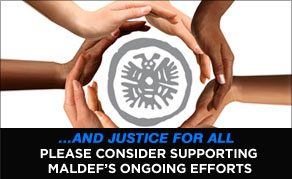APPEAL DOCKETED TO STOP ERRONEOUS KANSAS COURT ORDER FROM BLOCKING VOTER PARTICIPATION
MALDEF Action Seeks to Vindicate Simple Federal Voter Registration Form
DENVER, CO - MALDEF has appealed a recent court order that disrupts the national system of registering voters in federal elections. In the case, a federal district court in Kansas ordered the U.S. Election Assistance Commission to make changes to the federal mail voter registration form in order to require voter registrants in Kansas and Arizona to provide additional, burdensome paperwork to prove their U.S. citizenship. The decision runs contrary to the result in Arizona v. ITCA, a case won last June by MALDEF, in which the U.S. Supreme Court held, by a 7-2 vote, that state-voting laws must yield to the National Voter Registration Act (NVRA) of 1993.
"Courts make mistakes, and this was a most egregious one that would bar new voters from fulfilling their civic duty and participating in federal elections," stated Thomas A. Saenz, President and General Counsel of MALDEF. "We look to move swiftly in order to restore the precious right to the thousands who would be wrongly denied it."
Federal law, specifically the NVRA, permits U.S. citizens from any state to register to vote by means of a simple, standardized postcard. Applicants sign the postcards, under penalty of perjury, affirming their citizenship and other qualifications. No additional documentation is necessary or requested under this law. In its Arizona v. ITCA decision, the U.S. Supreme Court held that Arizona can require additional paperwork related to citizenship in the state's voter registration system but could not impose those requirements on the federal mail voter registration postcard. The U.S. Supreme Court made clear that only the U.S. Election Assistance Commission (EAC) can decide whether to incorporate state documentary proof of citizenship requirements into the federal form.
Arizona and Kansas have never been able to show that a single non-citizen used the federal voter registration post card to register to vote, yet they requested that the EAC make the citizenship changes to the federal form late last year. In a comprehensive decision nearly 50 pages in length, the acting EAC executive director denied that request earlier this year. The states asked to have the EAC decision reviewed by a U.S. District Court in Kansas, and late last month, that court ordered the EAC to include the requested citizenship changes.
"Arizona and Kansas want to re-try a case that was already decided," stated Nina Perales, MALDEF Vice President of Litigation and lead counsel for a group of Latino and other organizations that intervened in the case. "The US Supreme Court declared last term that state voter restrictions must yield to federal law, and we are confident of prevailing in our appeal."
Arizona's voter registration law prevented over 30,000 individuals from registering to vote before the U.S. Supreme Court declared that Arizona law must yield to federal law. And, in Kansas, a similar law has resulted in over 17,000 voter registrations being placed in suspense. Taken together, these laws disenfranchised nearly 50,000 U.S. citizens who were otherwise eligible to vote in federal elections.
Co-counsel with MALDEF are the law firms of O'Melveny & Myers LLP and Husch Blackwell. MALDEF filed its notice of appeal jointly with other organizations that are involved in the litigation, including the League of Women Voters of the United States, the League of Women Voters of Arizona, the League of Women Voters of Kansas, Project Vote, Inc., Inter Tribal Council of Arizona, Inc., Arizona Advocacy Network, League of United Latin American Citizens Arizona, and Arizona State Senator Steve Gallardo.
Founded in 1968, MALDEF is the nation's leading Latino legal civil rights organization. Often described as the "Latino Legal Voice for Civil Rights in America" MALDEF promotes social change through advocacy, communications, community education and litigation in the areas of education, employment, immigrant rights and political access. For more information on MALDEF, please visit: www.maldef.org.
For all media inquiries, please contact Larry Gonzalez.
